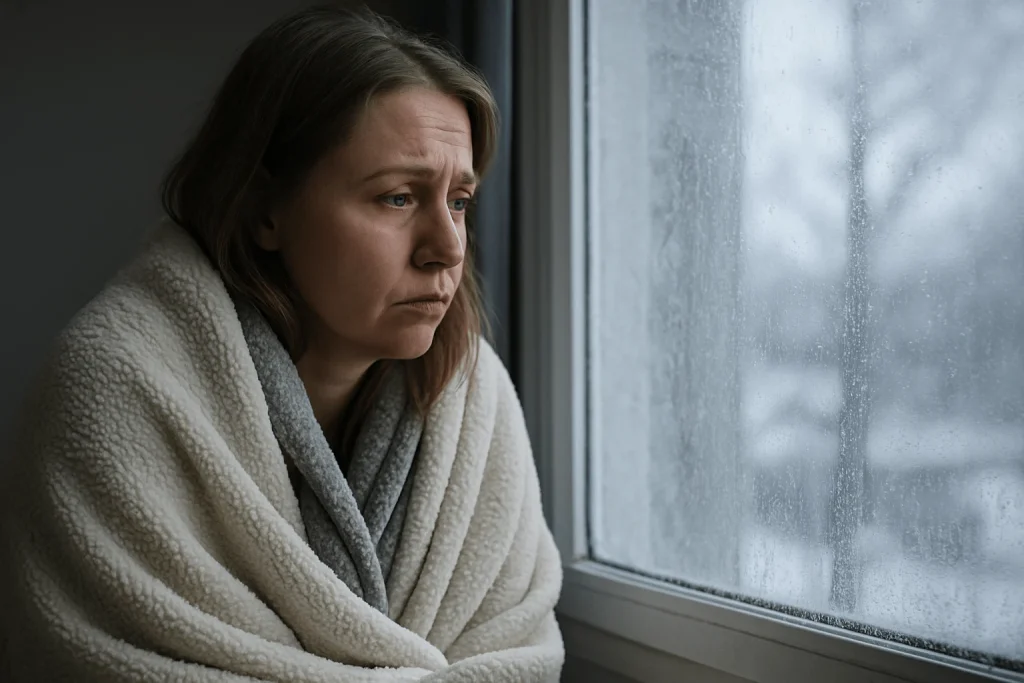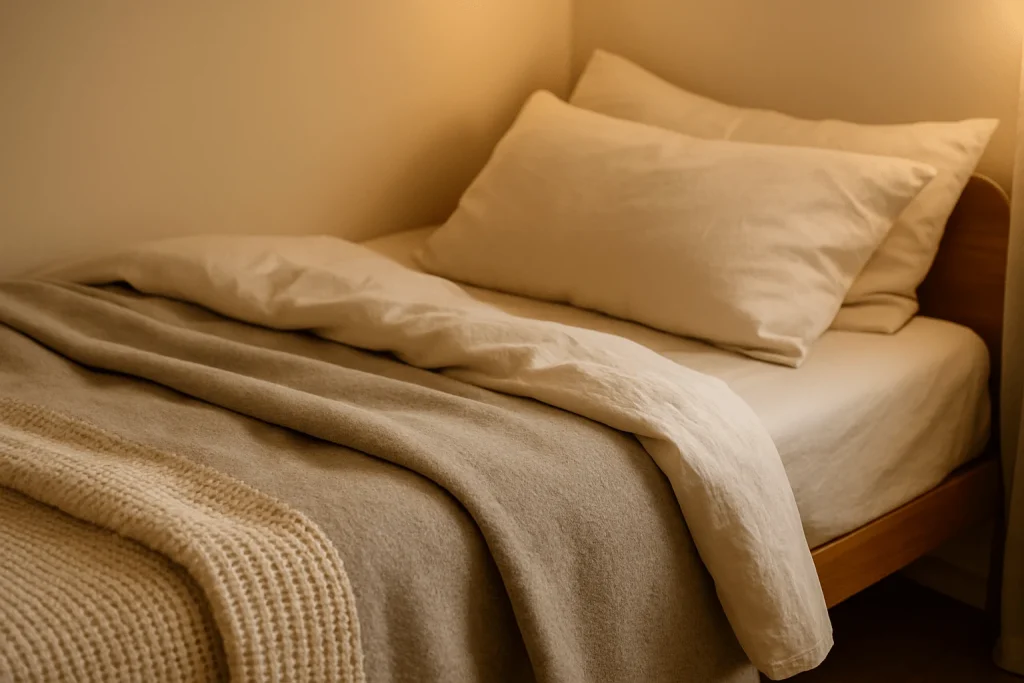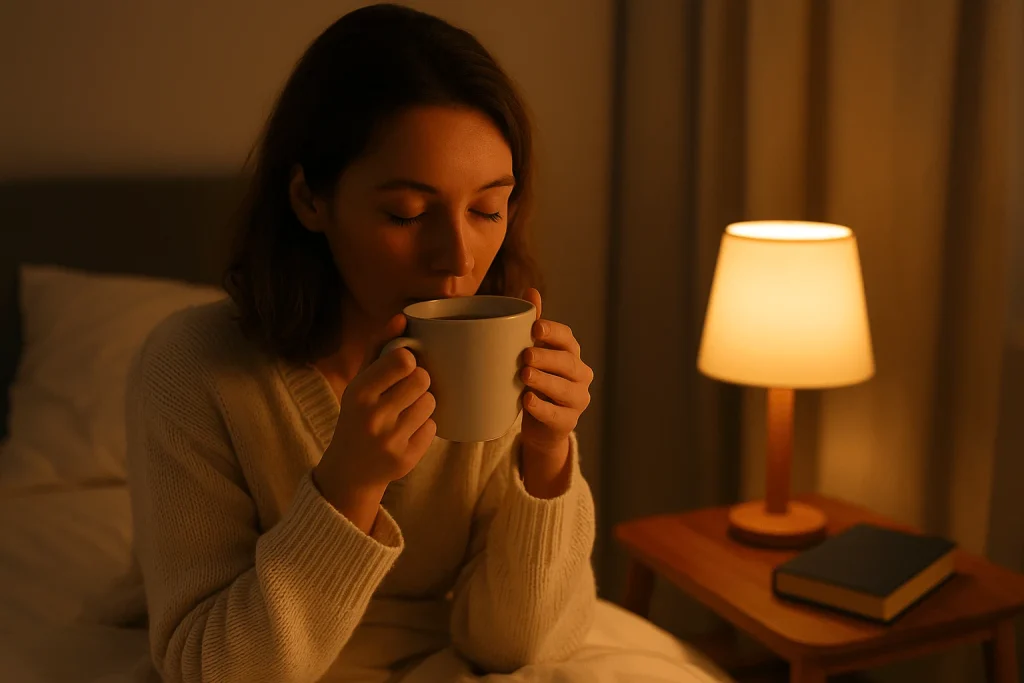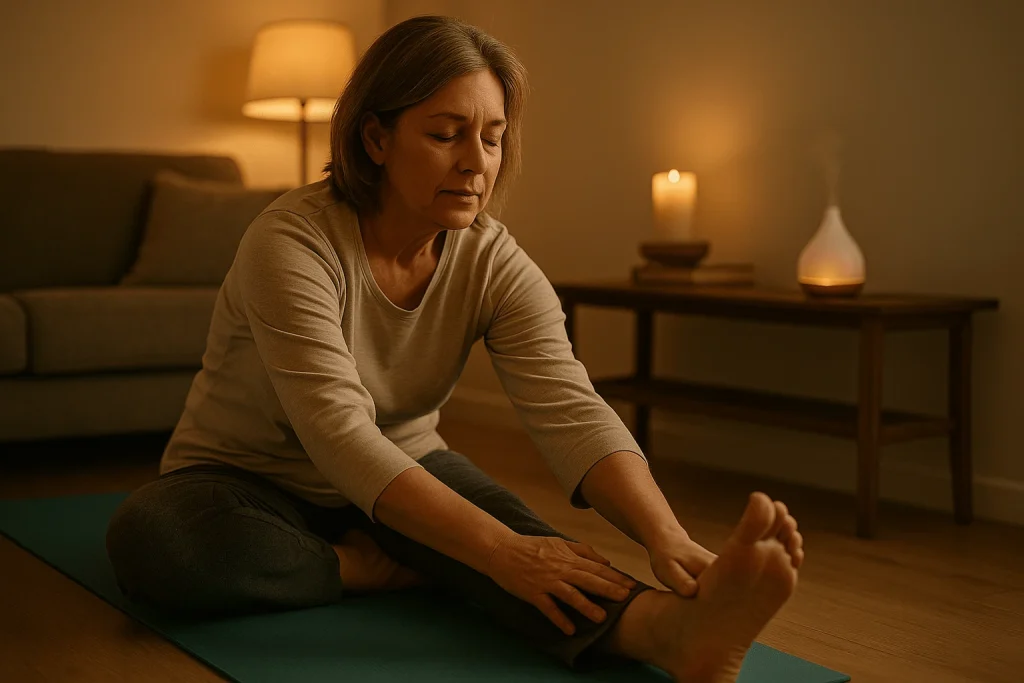As the days grow shorter and the temperature drops, many people find that getting quality sleep becomes more difficult. You might assume that colder weather would make for better rest — cozy blankets, darker evenings, and less noise outside. But winter actually brings its own set of challenges that can disrupt your sleep cycle and leave you feeling more fatigued than refreshed.
In this post, we’ll break down why winter affects your sleep, and more importantly, what you can do about it. From adjusting your bedroom environment to using natural remedies and light therapy, you’ll find clear, evidence-backed tips that work — even when it’s dark by 5 p.m. and freezing outside.
Why Is It Harder to Sleep in Winter?

If winter leaves you feeling sluggish during the day but restless at night, there’s a reason. Cold-weather months can disrupt the systems that regulate sleep — from your body’s internal clock to the way you manage temperature and movement. Understanding what’s behind these seasonal changes makes it easier to adjust and sleep more deeply through the darker months.
Disrupted Light Exposure Throws Off Your Sleep-Wake Rhythm
Sunlight plays a major role in regulating your sleep-wake cycle. When days get shorter, you’re exposed to less light — especially in the morning — which impacts melatonin production. That’s the hormone responsible for making you feel sleepy at night.
With less natural light early in the day, your body’s internal clock can shift later, making it harder to fall asleep on time and wake up feeling refreshed. Getting outside within an hour of waking, even on overcast days, can help realign your rhythm and support better sleep patterns.
Colder Temperatures Make It Harder to Get Comfortable
Your body naturally cools down at night to prepare for sleep, but external cold can throw off that process. A room that’s too cold — or bedding that doesn’t breathe well — can lead to poor temperature regulation and frequent waking.
The ideal sleep temperature is generally between 60–67°F (15–19°C). Layered bedding, breathable fabrics, and warm socks (if your feet get cold) can help you find that comfortable middle ground without overheating.
Mood Shifts and Winter Blues Disrupt Rest
As sunlight decreases, some people experience seasonal affective disorder (SAD) — a form of depression tied to the changing seasons. Even for those without SAD, it’s common to feel more anxious, withdrawn, or low-energy in the winter months.
These emotional shifts can throw off your sleep. Stress, low mood, and racing thoughts can all interfere with your ability to relax at night. During the day, building in movement, staying connected socially, and getting outside for light exposure can improve both mood and sleep quality.
Less Physical Activity = More Restlessness at Night
Winter often means staying indoors, moving less, and spending more time sitting — all of which can make it harder to fall asleep. Regular physical activity helps regulate hormones, ease stress, and tell your body it’s time to wind down.
Even light movement like indoor walking, stretching, or gentle yoga can reduce restlessness and support more restorative sleep. The key is consistency, not intensity.
Create a Cozy Sleep Environment for Cold Nights

If your bedroom isn’t set up to support winter sleep, even the best intentions can fall flat. Cold air, dry heat, and heavy bedding can all interfere with the comfort your body needs to fall and stay asleep. The good news? With a few thoughtful adjustments, you can create a space that encourages deeper rest — no matter how cold it gets outside.
The Best Room Temperature for Sleep in Winter
Your body’s sleep process relies on a gentle drop in core temperature. But when the room is too cold — or when you overheat under thick blankets — it can interrupt this natural pattern. The sweet spot for most people is between 60–67°F (15–19°C).
To maintain that balance, consider a programmable thermostat or a safe, low-noise space heater. Stick to breathable sheets and layered bedding so you can adjust easily through the night. If you often wake up hot or cold, simplifying your sleep setup can reduce those wake-ups significantly.
Choosing the Right Bedding and Sleepwear for Winter
Thick comforters and flannel sheets might seem cozy, but they can trap heat and cause sweating during the night. A better option is to layer lighter, breathable materials so you stay warm without overheating.
Natural fibers like cotton, bamboo, or wool help regulate body temperature without locking in moisture. A cotton base sheet, soft blanket, and optional throw let you adjust as needed. And if cold feet are a problem, adding socks to your routine can make it easier to fall asleep by improving circulation.
Try to avoid synthetic fabrics, which tend to trap heat and may lead to night sweats or restless sleep.
Add Humidity to Combat Dry Winter Air
Indoor heating systems and cold outdoor air combine to create a dry sleep environment, which can lead to irritated sinuses, dry skin, and disrupted breathing overnight. Even if you’re not fully waking up, dry air can pull you out of deeper sleep stages.
A small cool-mist humidifier can make a big difference. Aim for a humidity level between 40–50% in your bedroom. You’ll likely notice clearer breathing, less congestion, and fewer sleep interruptions. For added comfort, a drop of lavender or eucalyptus essential oil (as long as you’re not sensitive) can bring a calming scent to your nighttime routine.
Block Drafts and Eliminate Sleep Disruptions
Winter winds, drafts from windows or doors, and even early sunlight can break your sleep rhythm — especially in the lighter morning hours. Small upgrades help maintain a peaceful environment all night long.
Start by sealing cracks or adding a door draft stopper. Thermal curtains can insulate your room from drafts and block early light, helping you stay asleep longer. If noise is an issue, a white noise machine or gentle fan can drown out outside sounds and create a more consistent sleep atmosphere.
Natural Remedies for Winter Insomnia That Actually Work

When winter throws off your sleep, it can be tempting to reach for quick fixes — but there are effective, natural ways to restore rest. From light therapy to calming teas, these approaches support your body’s natural rhythms without relying on medication. They’re especially helpful if you’re dealing with winter insomnia, seasonal depression, or just a general feeling of restlessness at night.
Light Therapy Can Reset Your Sleep-Wake Cycle
One of the most effective tools for improving sleep in the colder months is light therapy — especially if you’re waking up groggy or struggling to fall asleep at night. A bright light box, used in the morning, mimics natural sunlight and helps signal to your brain that it’s time to be alert.
Most people benefit from using a 10,000-lux light box for 20–30 minutes shortly after waking. It’s best to sit near the light (not staring into it directly) while you read, eat breakfast, or do something calm. Over time, it can shift your internal clock earlier, improving both your energy and sleep quality.
Herbal Teas That Calm the Mind and Body
Herbal teas are one of the simplest ways to ease into sleep mode, especially when the body is tense or the mind feels overstimulated. Teas like chamomile, lemon balm, passionflower, or lavender have long been used for their calming effects.
Sipping a warm, caffeine-free tea about 30–60 minutes before bed can help relax your nervous system. Just be mindful of how much liquid you drink if you tend to wake up during the night to use the bathroom. A small mug is often enough.
Natural Supplements to Support Sleep in Winter
Some people find relief with supplements — particularly magnesium and melatonin. Magnesium helps relax muscles and calm the nervous system, while melatonin can help reset your body’s internal clock when used short-term.
Magnesium is often taken as glycinate or citrate in low doses (consult your doctor if unsure). Melatonin may help if you’re struggling with a delayed sleep schedule — common in winter due to late-night screen time or minimal daylight exposure. If using melatonin, start with a low dose (around 0.3 to 1 mg) and avoid long-term use unless advised by a healthcare provider.
Breathwork and Guided Relaxation for Easier Sleep
Simple breathing exercises and calming routines can help transition your body into sleep mode — especially when stress or tension is part of the problem. Practices like 4-7-8 breathing, progressive muscle relaxation, or short body scan meditations are highly effective.
You don’t need an app or a perfect environment to start. Try turning off screens an hour before bed, dimming the lights, and spending just five minutes focusing on your breath. Over time, this helps your brain associate nighttime with calm, not stimulation.
Related Posts:
- 7 Herbal Teas for Sleep That Calm Your Mind Fast
- 7 Powerful Breathing Exercises for Better Sleep You Can Try Tonight
Build a Winter-Friendly Bedtime Routine

Getting great sleep in winter isn’t just about what you do right before bed — it’s about building a steady rhythm your body can rely on. The darker months can throw that off, especially if your evenings are packed with screen time, late meals, or inconsistent habits. A few intentional changes to your routine can help reset that rhythm and signal to your body that it’s time to rest.
Ease Into the Evening Without Screens
It’s easy to fall into the habit of scrolling before bed — especially when it’s cold and dark outside. But screens emit blue light, which tells your brain to stay alert and delays melatonin release. That means it can take longer to fall asleep, even if you’re tired.
Start by setting a “cut-off time” for screens about 60 minutes before bed. Instead of watching TV or checking your phone, try low-light activities like reading, journaling, or listening to a calming podcast. These small changes reduce stimulation and help your brain begin to wind down naturally.
Create a Warm, Grounding Evening Ritual
Winter is the perfect time to build a bedtime routine that feels comforting. Simple rituals like a warm bath, cozy lighting, or foot massage with calming oils can help your nervous system shift into rest mode.
You don’t need a long list of tasks — just one or two grounding activities done consistently. Warmth and comfort signal safety, which helps the body release tension and prepare for deeper sleep.
Adjust Your Sleep Schedule to Match Natural Light
Your body’s clock is heavily influenced by light exposure — both morning and evening. In winter, it’s common to drift into a later sleep schedule, especially if you’re not exposed to early daylight. The problem? Sleeping too late or going to bed after midnight can throw off your energy and focus the next day.
Instead of fighting your body, gradually shift your bedtime earlier in 15-minute increments over a few days.. Try to wake up at the same time each morning — and get light exposure early, even if it’s just stepping outside with a hot drink. These shifts help reinforce your body’s sleep-wake rhythm.
Keep Moving, Even When It’s Cold
Reduced movement in winter can lead to restlessness at night. When your body hasn’t had a chance to release physical tension or burn off energy, it’s harder to wind down. The good news is that you don’t need intense workouts to make a difference.
Light movement like stretching, gentle yoga, or a 10-minute indoor walk can help regulate stress hormones and make it easier to fall asleep. Try doing something physical — even low-key — in the afternoon or early evening to support a more restful night.
Winter Foods and Habits That Support Better Sleep

Cold weather often brings shifts in appetite, cravings, and hydration — all of which can impact your ability to fall and stay asleep. Heavier meals, late-night snacks, and dehydration can all work against your body’s natural sleep cycle. By making a few smart changes, you can create evening habits that support, rather than sabotage, your rest.
Nourish with Foods That Naturally Promote Sleep
Certain nutrients play a direct role in producing sleep-regulating hormones like melatonin and serotonin. Foods rich in tryptophan, magnesium, and vitamin B6 are especially useful in winter, when your body may need extra support.
Great choices include oats, bananas, almonds, pumpkin seeds, turkey, and warm milk. These can be incorporated into an evening snack or light dinner to encourage a smoother transition into sleep — without the heaviness that disrupts digestion.
Avoid Common Sleep Disruptors in Winter Meals
Comfort foods in winter often lean heavy, sugary, or spicy — and while they may be satisfying in the moment, they can interfere with digestion and sleep quality. Alcohol and caffeine are also common culprits.
Try to finish your last full meal at least 2–3 hours before bed, and avoid high-sugar or high-fat snacks late at night. If you want something warm and calming before bed, consider herbal teas or a light snack that includes complex carbs and protein (like whole grain toast with almond butter).
Hydrate Wisely — Without Waking Up at Night
Dry indoor air, layered clothing, and heated rooms can all increase fluid loss — yet many people drink less water in winter without realizing it. Dehydration can cause muscle cramps, headaches, and poor sleep quality.
At the same time, overhydrating too close to bedtime can result in multiple wake-ups. To avoid overnight wake-ups, try to stay hydrated during the day and limit fluids in the hour before bedtime.. A small mug of warm herbal tea or water is fine if your throat feels dry at night, but avoid large quantities late in the evening.
Bottom Line
Winter doesn’t have to mean restless nights and sluggish mornings. By understanding how seasonal changes affect your body — and making small, practical adjustments — you can improve the quality of your sleep in meaningful ways.
Whether it’s getting outside for early light, adding a humidifier to your room, or adjusting your bedtime routine, the key is consistency. Start with one or two changes that feel doable, then build from there. Over time, these habits work together to support deeper, more restorative rest — even on the darkest nights of the year.
If you’re not sure where to begin, start with your sleep environment. A warm, quiet, and well-regulated space makes every other change easier to follow through on.
FAQs: How to Sleep Better in Winter
Why is it harder to sleep in winter?
Shorter daylight hours and colder temperatures disrupt your body’s natural rhythms. You may produce melatonin at the wrong times, feel emotionally off-balance, or move less — all of which make falling and staying asleep more difficult.
Does cold weather affect sleep quality?
Yes. While a cool room is ideal for sleep, being too cold — or overheating under heavy bedding — can lead to shallow sleep and nighttime waking. The goal is balanced warmth using breathable, layered bedding and a room temperature between 60–67°F (15–19°C).
Can light therapy help with winter insomnia?
Light therapy is one of the most effective tools for resetting your internal clock in winter. Using a 10,000-lux light box shortly after waking can improve mood, energy, and nighttime sleep by supporting a healthier circadian rhythm.
What are natural remedies for winter sleep problems?
Several natural remedies may help, including morning light exposure, herbal teas like chamomile or lemon balm, magnesium or melatonin (if appropriate), warm baths, and breathwork practices that calm the nervous system.
What foods help you sleep better in winter?
Foods rich in magnesium, B6, and tryptophan — like oats, bananas, almonds, turkey, and warm milk — can support melatonin production and relaxation. Avoid sugar, alcohol, and caffeine too close to bedtime, especially in colder months.

